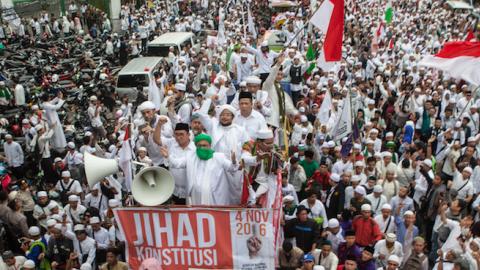The election of Jakarta’s governor usually draws zero attention outside Indonesia. But the current race to lead the capital of the world’s largest Muslim-majority country has drawn the attention of American, British, Japanese, Russian, Chinese, and German broadcasters, not to mention the world’s most prominent daily newspapers.
The campaign itself is lively enough, involving the families of four former presidents, demonstrations by half a million people, smears about religion and ethnicity, and police investigations into the possibility that a prominent Islamist used WhatsApp to send pornography to a woman suspected of treason. On top of all this, the leading candidate is currently on trial for blasphemy, shuttling daily between the courtroom and the campaign trail. The recent U.S. presidential election looks sedate by comparison.
Beyond all the drama, though, Jakarta’s vote will be a key indicator of larger trends in the Muslim world — whether charges of blasphemy will continue to threaten and silence minorities and reformers, and whether radical forms of Islam will undermine and replace their key Muslim opponent: the Islam of Indonesia.
The current front-runner in the election is Basuki Tjahaja Purnama, universally known as “Ahok.” He is aggressive and outspoken, which is a great handicap in a society that praises politeness and harmony. He is also a double minority — ethnic Chinese in a country where anti-Chinese sentiment remains strong, and Christian in a country that is 85 percent Muslim. But he has a deserved reputation for being honest, intensely practical, and competent, which are attractive qualities to the residents of the sprawling, congested, and frequently flooded metropolis.
These latter virtues made Ahok the clear leader in the race’s earliest months. But in a campaign speech on September 27, 2016, he referred to a Koranic verse — al-Maidah 51, warning Muslims against taking Jews or Christians as allies — that he said was being used by some Islamists to assert that Muslims were forbidden to vote for a Christian.
Several days later, a misleadingly edited video of the talk, omitting some of Ahok’s key words, was posted on the Internet and rapidly went viral. The semi-official Indonesian Ulema Council then issued a fatwa saying that he had blasphemed. The Islamic Defenders Front (FPI), a radical group hitherto noted mainly for attacking liquor stores, restaurants open during Ramadan, nightclubs, churches, and Muslim minorities, teamed up with the newly formed “National Movement to Safeguard the Indonesian Ulema Council’s Fatwa” (GNPF-MUI) and called for demonstrations demanding that Ahok be put on trial.
On November 4 and December 2 there were massive, largely peaceful demonstrations against blasphemy, one of them drawing half a million people. On November 16, the police announced that Ahok was now officially suspected of blasphemy and they were preparing a case for prosecutors. He is now on trial and could get up to five years in prison.
Meanwhile, the leaders of the massive organizations that lie at the heart of Indonesian Islam, Nahdlatul Ulama (NU) and Muhammadiyah — they have perhaps 50 million and 40 million followers, respectively —counseled calm and advised their members to avoid demonstrations and instead simply vote for those they believed would contribute most to the public good.
Despite these pleas, some senior members of NU and Muhammadiyah still joined in the accusations directed at Ahok, and the two necessarily cumbersome organizations seemed daily to be outflanked by nimbler, more-radical groups that could rapidly adjust to the capricious cycles of a heated campaign. There was fear that radicalism was gaining the upper hand in the struggle for popular support.
This has significance beyond Indonesia, for NU and Muhammadiyah are by far the largest organizations in the Muslim world and are famously tolerant. They were created a century ago partly as an alternative to Saudi Wahhabism. One of NU’s founders, Muhammad Faqih Maskumambang, wrote Menolak Wahhabi (Wahhabism rejected) in 1922, reprints of which are still sold in NU outlets.
A century ago, when almost no Westerners even knew of the existence and significance of the now influential Saudi sect, Indonesians were already struggling against it, as NU attempted to counteract radical Islam by articulating and promoting a version of the religion compatible with a pluralistic society.
While there is strong opposition to radicalism throughout the Muslim world, these organizations, together with Indonesia’s network of state Islamic universities and their impressive scholars, provide the single most important counter-narrative to radicalism. Their fate will help shape the future of the Muslim world, which in turn will have a huge effect on U.S. defense and foreign policy.
On Sunday, February 26, the official results were announced and they were reassuring. Ahok received 43 percent of the vote, and his two rivals received 40 percent and 17 percent. Since nobody garnered more than half of the vote, there will be a runoff in April between the two leading vote getters.
Ahok may well lose the runoff by a narrow margin, and he is still on trial. But the fact that a Chinese Christian currently on trial for blasphemy has come out on top in the initial vote to lead the capital of the world’s largest Muslim country is a source of great hope. In many other countries he would be dead, or forced into exile. Indonesia’s tolerant teachings and culture remain strong and are an important reason for the U.S. to pay it more attention.



















